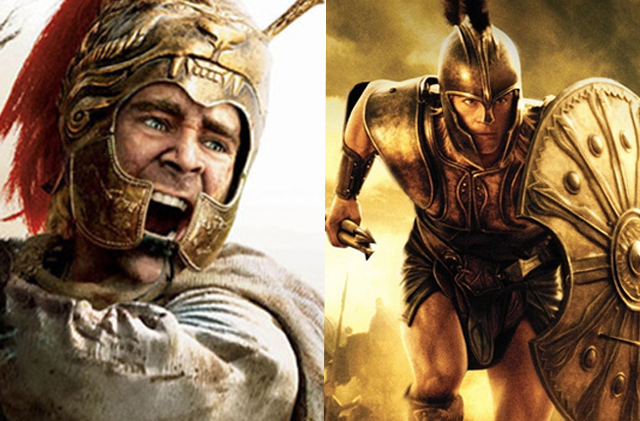
Epic movies probably define the character of Hollywood more than any other type of film. They are big, excessive monsters of cinema that reflect the over-the-top excesses of the industry itself, and that’s what draws many audiences to them. They are the epitome of what the art of cinema can do, as long as they are done well. One downside to epic film-making is the enormous cost behind them, and not just in terms of dollars and cents. These productions are painstaking efforts that take much longer to make and must include long commitments from their actors and crew to pull them off. David Lean’s Lawrence of Arabia (1962) for example filmed over a 18 month shooting schedule in the Arabian desert where temperatures would consistently rise to over 100 degrees during the day. It took a lot of commitment on the people involved to see that through, and they were making a film that wasn’t even recreating a far off time period. Epics, in turn, are some of Hollywood’s most prized accomplishments, at least in regards to the classic era of cinema. Apart from historical dramas like Lawrence or Gone with the Wind (1939), the most popular form of epic in these early days tended to be the Biblical epic. Sure, the biblical stories could satisfy some of the moral backbone that many audiences wanted from their movies, but they also gave other audiences something more and that was spectacle; bloody battles, sword fighting, romance, and pageantry on a massive scale. These in time became known as the “Sword and Sandal” Epic and during Hollywood’s Golden Era, they also proved to be big business. Films like The Ten Commandments (1956), Ben-Hur (1959), and Spartacus (1960) dominated cinemas and despite their astronomical costs to make, they also proved to be profitable.
But, like many other fads in Hollywood, the “Sword and Sandal” epic spectacle saw it’s own decline. Costly failures like Cleopatra (1963) and The Fall of the Roman Empire (1965) brought the genre down to it’s knees, and for many years the genre was deemed to risky a venture for most studios. But, after the renegade 70’s, Hollywood began to return to spectacles again with the rise of the “Blockbuster.” Though spectacle became widely accepted by audiences again, it would take some time for the “Sword and Sandal” epic to find it’s footing again. A major push came unexpectedly in the form of Mel Gibson’s Braveheart (1995), which presented an entertaining throwback to the excessive epic dramas of old Hollywood, but with the benefit of less censorship over the brutal violence that defined the time period. Meeting Braveheart‘s challenge, director Ridley Scott created his own throwback homage to “Sword in Sandal” epics in the form of Gladiator (2000), which completely reinvigorated the genre for a new generation. Gladiator took all the elements of the “Sword and Sandal” epic and gave it an earnest approach that clicked with modern audiences, thanks to charismatic performances from the likes of Russell Crowe and Joaquin Phoenix and astounding epic sense of scale. It was a box office hit and even surprised everyone by winning Best Picture at the Oscars. But, like with most unexpected hits in Hollywood, it also spawned it’s fair share of copycats. Warner Brothers, hoping for big profits of their own, took the ambitious step of releasing two “Sword and Sandal” epics months apart from each other in 2004, and let’s just say that what worked for Gladiator didn’t exactly work for them. In this article, I will be looking at these two attempts at modern epic film-making, Wolfgang Petersen’s Troy (2004) and Oliver Stone’s Alexander (2004), and see which one better satisfied as a true representation of it’s genre.
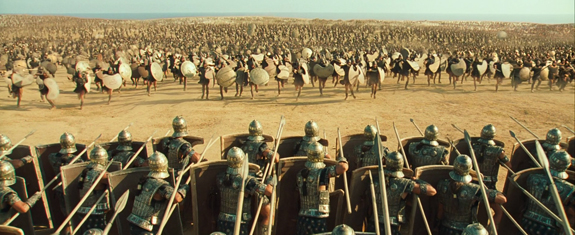
“Do you know what’s waiting beyond that beach? Immortality! Take it! It’s yours!”
When both Troy and Alexander premiered in 2004, many had hoped that they would follow in Gladiator‘s footsteps to box office and awards glory. Instead, they were received tepidly by critics and fell way short at the box office, more so in Alexander‘s case. On the surface, you can’t really pinpoint exactly what went wrong. They followed the Gladiator formula both visually and narratively. They both come from very familiar epic stories; Troy based on legend and Alexander based on real historical figures. Both are lavishly constructed and display every cent of their nearly $200 million budgets. So, how did they both fail? More than anything it’s their flawed executions that sunk both films. Despite having Gladiator to thank for their existence, living in it’s shadow may have also been one of the factors against them. When Ridley Scott created his Oscar winner, he was tackling an old, out-of-date genre that no one had any regards for anymore, which allowed him more creative freedom to create a more cohesive and engaging vision. By contrast, Troy and Alexander had Gladiator to live up to and both buckled under the expectations put on them. But, what is interesting about the two is that while flawed, their failures and strengths are so different that it does offer up some intriguing contrasts. Namely it’s in the style of the film-making that was given to their productions, the strengths of their overall casts, and the seriousness that they approach their subjects and themes that separate the two. Of these two ambitious failures that represented the collapse of this short-lived revival of the “Sword and Sandal” epic, one must clearly stand as the better effort and it’s that contrast that will help determine which one stands taller than the other.
First of all, what does define the genre more than anything? Spectacle. Troy has the benefit of being directed by a filmmaker comfortable with bringing spectacle to the big screen. Wolfgang Petersen made a name for himself with his ambitious war epic Das Boot (1981) and he continued to grow as a filmmaker, taking on both gritty action thrillers like In the Line of Fire (1993) and Air Force One (1997), and effects heavy spectacles like The Perfect Storm (2000). His The NeverEnding Story(1987) however represents the filmmaker at his most imaginative, showing a great sense of pageantry in his work that could have made him a great fit for the “Sword and Sandals” epic genre. The results in Troy are a little mixed however. His sense of scale is impressive, especially the grandiose battle scenes and the epic flyover shot of the Greecian fleet on it’s way to war with Troy. But, there’s also a severe lack of character to the film’s presentation. All the battle scenes look the same as the movie goes along, which seems to be an unfortunate result of the film’s singular location; with the Baja Californian coast playing the part of the Trojan harbor. Most of the movie is washed out in constant sunlight and we see the same drab stone walls and sandy beaches for most of the film’s runtime. It’s a lack of diversity that hinders the visual presentation. Alexander by contrast benefits from a more varied approach. Oliver Stone, while not known for tackling the epic genre much in his career, does take an ambitious approach to his staging here. The film was shot all over the world in locations as varied as Morocco and Thailand, with some of the battles being spectacularly staged and distinct. One in particular, against an army riding aboard stampeding elephants is jaw-droppingly beautiful and shows more creativity than any of the many battles in Troy. This is one element that Alexander has over Troy, and it makes for a more visceral experience as a result.
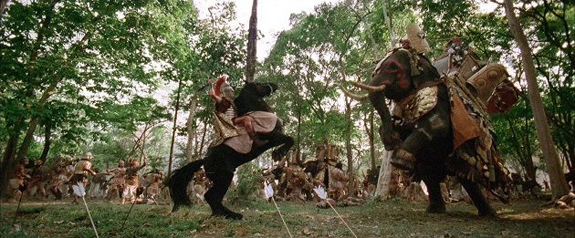
“Conquer your fear, and I promise you, you will conquer death.”
Unfortunately, despite Oliver Stone’s strong visual sense, he has less success with the direction of his actors. The cast of Alexander is a really big mish-mash of poor casting and really bizarre performance choices. Some of the cast are surprisingly effective; Jared Leto as Hephaistion for example. But there is also a fair share of really over-the-top and terrible performances from normally talented people here; some funny (Val Kilmer as historical Macedonian king Philip) and others that are just awful (Angelina Jolie as Queen Olympia, with an indeterminate accent). But, worst of all is the lackluster effort by it’s lead: Colin Farrell as Alexander the Great. This is one of histories most influential figures; a man who conquered the entire known world in his day. To pull off this role you need someone inspiring, and Farrell is not that. The casting of Colin as Alexander probably had more to do with his rising star status at the time and less to do with his actual potential in the role. Thankfully he would mature as an actor years later in movies like In Brudges (2008), but when you seem him staring blankly and looking foolish in a blonde wig as he does here, you can easily see how his miscasting hurt the movie. Troy doesn’t fare much better with it’s lead. Brad Pitt is out of place as legendary hero Achilles and he can’t bring more to the character other than a few ominous stares and grunting arrogant tough guy dialogue. The rest of the cast in Troy is a bit more balanced than in Alexander however, especially the veterans like Brian Cox and Peter O’Toole. The casting of Sean Bean as Odysseus alone makes me wish that they had continued on with him in an adaptation of The Odyssey; plus it’s a rare role that leaves him alive at the end. Also in addition, Troy has the best performance overall from both movies and that’s Eric Bana as Hector. He comes off as the true hero of the film; sympathetic and very much within the story’s world. So, the use of it’s cast benefits Troy more, because they at least feel more at home in their roles overall.
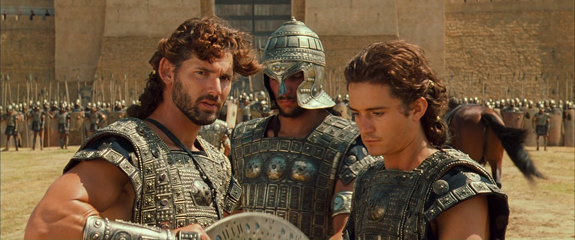
“Men are haunted by the vastness of eternity. And so we ask ourselves: will our actions echo across the centuries?”
Another thing that distinguishes these movies from one another is the effectiveness of their presentations on the stories they tell. In a way, both movies suffered from the fact that we all know the narratives already. Troy takes it’s cue from Homer’s The Iliad, which is commonly read in schools and literary circles across the world, and Alexander follows the exploits of it’s real life historic figure. What benefited Gladiator was the fact that it was an original, fictional tale set within a historical setting around real historical figures. As a result, we were able to get a look into historical ancient Rome through the eyes of a protagonist whose story was completely new to us, thereby making it more intriguing. Troy and Alexander needed to make the familiar feel fresh again due to the fact that we already know what happens by the end; Troy is destroyed by a wooden horse after Achilles is undone by exploiting the weakness in his heel, and Alexander’s empire falls apart after extending his armies too far and succumbing to the conspiracies led by his commanders, leaving him dead while still in his prime. To Alexander’s benefit, Oliver Stone takes a less than conventional approach to telling the life story of Alexander the Great. The story is told through the recollections of Alexander’s trusted ally Ptolemy (Anthony Hopkins) as he dictates his memoirs, and through this motif, the story unfolds out of order. We begin the film with Alexander at his most triumphant, defeating the Persian Empire, but then as the film goes on, new recollections come into play, revealing new layers about the character and it deconstructs the man from the legend. Troy on the other hand tells the story as a straight forward action thriller. It works in that respect, but it lacks the engaging disjointedness of Alexander‘s approach, as well as the magical elements of Homer’s poem. In this respect, I find that Alexander‘s confused focus actually works to it’s benefit. It’s disjointed, but it keeps it from being bland.
This is something that’s more of a result of the different filmmakers styles than anything. Petersen is a very commercial director, able to deliver scale and action exactly the way that the studios wants them. Oliver Stone on the other hand is a bit of a rebel as a filmmaker and it’s any wonder why he was able to secure enough clout in order to make a big screen epic like this one given his reputation. But, Stone’s instincts as a filmmaker does give him something that Petersen doesn’t have, and that’s the ability to be subversive with his movies. Alexander may be a mess with many things, but there is something to admire about it’s ability to tackle more challenging themes with it’s story. In Troy, the themes tend to center more around the making’s of a hero, and most of it is delivered in a clunky, unsubtle way. We hear Achilles talk about immortality and his place in history in a way that feels too self aware. It also treats it’s themes in a very commercial and non-controversial way. Alexander on the other hand tackles some very heavy issues, such as the relativity of good and evil and the responsibilities of kings. But perhaps the film’s most commendable act is that it does’t shy away from the historical account of Alexander the Great’s homosexual relationship with Hephaistion. For a big budget epic like Alexander to openly address this at a time when gay themes were still absent in Hollywood movies in general was a bold step on Stone’s part. It’s also a missed opportunity on the part of Troy too. Homer’s epic poem stated that Achilles had a male lover as well named Patroclus, but in the movie the character (played by Garrett Hedlund) is turned into Achilles’ cousin, thereby removing the sexuality angle. Wouldn’t it have been revolutionary to have an epic action movie where the tough, heroic main character played by one of Hollywood’s A-list leading men portrayed as openly Gay? Sadly, Troy was not that progressive, but on the other hand, Alexander was and in that respect, it’s the much more admirable film.
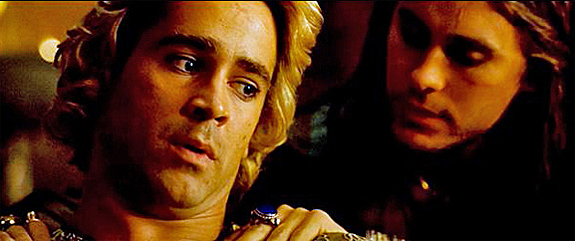
“My poor child. You’re like Achilles: cursed by your greatness.”
By no accounts are either Troy and Alexander great movies. But, neither are they embarrassments either. Despite mediocre premieres, both movies still do well in the home video market. Oliver Stone in fact seems to hold the movie up as a passion project of his, having done three more cuts of the film since it’s debut a decade ago; each released separately on Blu-ray and DVD. His final cut even includes a classic Hollywood Roadshow presentation and a three and a half hour running time that greatly fixes may of the plot holes in the theatrical version. But, as the years have passed, I find myself drawn more to Alexander over Troy. And the simple fact is this; despite being more coherent and better acted, I just find Troy to be the more boring of the two. Alexander is a colossal mess, yes, but it’s an intriguing mess, made by a true artist. Wolfgang Petersen delivers on the action, but there’s nothing visionary about it. Troy just feels like a studio driven mandate rather than a genuine cinematic wonder. I just love Oliver Stone’s eccentricities in Alexander more, and it stands up over time much better, even though I still feel the main character in it is a bore. Are either movie worthy of the historical legacies behind them? Hardly, but hey, few Hollywood epics are historically accurate. Both films of course pale in comparison to their predecessor Gladiator, and it’s sadly a result of the quickly changing tastes of the audience that these movies didn’t hit their mark. The “Sword and Sandal” epic had a short reprieve before it was inevitably done in by deconstructive efforts like Zack Snyder’s 300 (2007). Even Ridley Scott failed to keep it alive when he followed up with his own ambitious Crusades epic Kingdom of Heaven (2005). Given the cost and the lackluster results these two movies ended up being, it’s unlikely we’ll see it revived again. For the brief time that it was reborn, it was interesting to see the “Sword ad Sandals” epic become a part of Hollywood again. And between the two, Alexander proved to be the victor just because it failed in a far more epic-ly appropriate way.
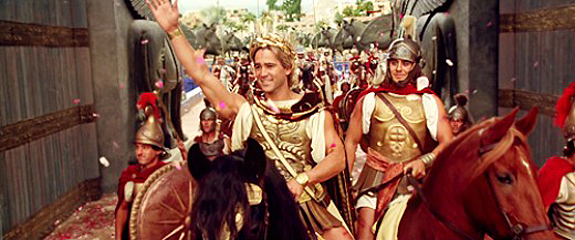
“Alexander used to say that we are most alone when we are with the myths.”